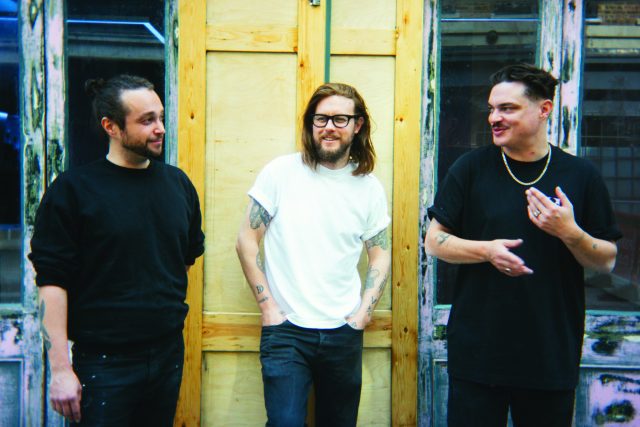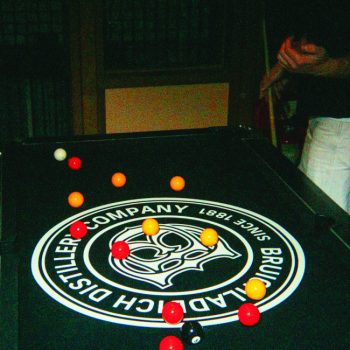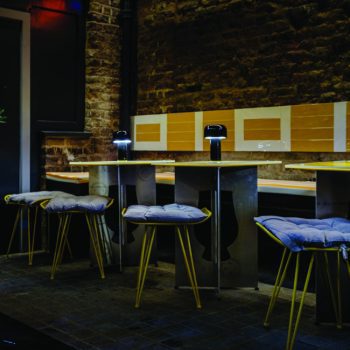Cocktail chat: Dram, London
Bartenders Chris Tanner, Martyn ‘Simo’ Simpson and Jack Wallis are bringing seasonality and approachable drinks to their new venture in London’s Tin Pan Alley.

*This feature was originally published in the January 2024 issue of The Spirits Business magazine.
“We wanted somewhere where you can have banging drinks and a good time without being too serious,” says Martyn ‘Simo’ Simpson, of his latest London venue, Dram Bar.
After eight years at the helm of Milroy’s, in early 2023 Simpson left the whisky bar and bottle shop. In November he opened Dram with former Milroy’s colleagues Chris Tanner and Jack Wallis. Located in Soho’s Denmark Street, Dram Bar represents the trio’s love of whisky and cocktails, with the aim of making the category more accessible to drinkers. It’s an impressive site, the three-storey 17th-century building encompassing two bars, a whisky shop, an outdoor terrace, and a private room with a ready-to-drink cocktail vending machine and a pool table. Simpson calls Dram an “evolution” of his former venues, Milroy’s, with its whisky focus, and cocktail bar Silverleaf in luxury hotel Pan Pacific London. “We’ve been building this place ourselves, it’s a passion project for three mates,” he adds.

Tanner notes that they had initially planned to open in 2024 but they happened to like the first venue they saw when viewing potential sites. “We walked in and it was a fucking shithole,” he says, explaining that they hadn’t intended to open a five-room bar.
Open from 9am to midnight on weekdays, and from noon to midnight on Saturdays, the ground floor serves coffee and small plates in the morning, before transitioning into a bar in the evening. A multi-purpose room in the basement serves as a lab for research and cocktail development, where the team members also create their own canned drinks for the vending machine, which can be bought with tokens from the bar.
Meeting the team, it’s evident that the word ‘fun’ is often used to describe the ethos for Dram, but at the heart of the venue is a dedication to hospitality. “Good hospitality should almost be invisible,” Wallis says. “It should just be something that if you’re a guest, your experience in a venue should be passive to the point of being looked after. Not thinking that you’re wanting for anything, but when you need something, it’s just there.”
Simpson chimes in: “It’s like walking into your home and you’re relaxed. We’re just trying to mimic that idea here.”
Guest experience
Speed of service is key for the bar, which offers a rotation of serves on draft, alongside a cocktail menu downstairs. Simpson explains: “Everything we do and everything we’ve designed is for the guest and the guest experience. Whether you’re getting a dram, a cocktail or a glass of wine, it all takes the same amount of time; you don’t have to wait 25 minutes for a drink.”
The ground-floor bar offers tapped cocktails (which take two days to make, says Wallis) including Mezcal & Coconut (Los Siete Misterios Mezcal, coconut water and fino Sherry) and Vodka & Passion Fruit (Ramsbury Vodka, lacto-fermented passion fruit cordial and passion fruit wine). The menu in the low-lit basement bar includes serves such as the Koji & Birch (Shio Koji, coconut, bitters, birch caramel and Brugal 1888) and Plum & Whey (Kentish plums, High Weald whey, El Dorado 3 Yearss Old and aquavit).
Tanner says of the drinks on tap: “We wanted something that was going to feel disposable in a way – like, if we’re going to put it on draft, we don’t want to do draft cocktails and didn’t necessarily want it to be Highballs, but it had to replace the role of the Spritz.” Tanner cited the low-ABV mezcal and coconut serve as one example.
 Wallis adds: “It’s not about being zero waste, it’s about getting the most out of the product.”
Wallis adds: “It’s not about being zero waste, it’s about getting the most out of the product.”
There’s a focus on seasonality, with drinks created based on what’s in season. The team worked with a company called Shrub, which connects operators to small farmers and growers around Kent.
“Every day I get messages about what’s in season,” says Tanner. “It’s quite a nice way to work, to prepare all of the individual ingredients. And then we’ll write the menu. That was fun.”
The trio would like to open the space up for collaborations in 2024, to everyone from artists to musicians. “We want it be a space for creative makers,” Wallis says, and “ingratiate ourselves with the culture of Denmark Street”, known for its strong music ties. “We want this to be somewhere that people in a creative industry or in the hospitality industry feel comfortable to come and hang out, and spend a day with the team in the lab.”
Staff progression
Education is also important to the trio, who are keen to help the staff progress. Tanner says: “There is a gap where bartenders are getting to a certain point and they’re like, ‘Well, where do we logically go from here?’ And there’s no real route to them going into ownership. The now-accepted route is becoming a brand ambassador or going into sales in three years. That’s not a bad thing, it’s just that it has completely overshadowed any other options. It’s really nice for us to be able to turn around and be like: we’re going to create a space for our team, to learn, to train, to have fun, then hopefully as a bartender-owned bar set a standard of what to expect in the industry.”
Simpson adds: “It’s our role as like operators and owners to go: right guys, where do you want to be in five years? How do we help you get there? Because that makes the industry better. Our ladder extends beyond our business.”
Simpson says the team is on-hand to help his employees learn from them about how they could open their own bars, from profit and loss to stock management.
Simpson is cautious about the future of the sector, which has struggled with staffing issues in recent years. He warns: “If we’re not careful, especially this country, after Brexit, you’re going to have a horrendous gap, with people that just go back to seeing the bar world and hospitality as a part-time job, or that this is just a stepping stone, when in reality, it’s a life for us.”
Related news
Peddlers Gin launches cocktail contest
